BDUK Corporate Plan 2022-23
Updated 29 April 2022

Family looking at tablet
Ministerial foreword
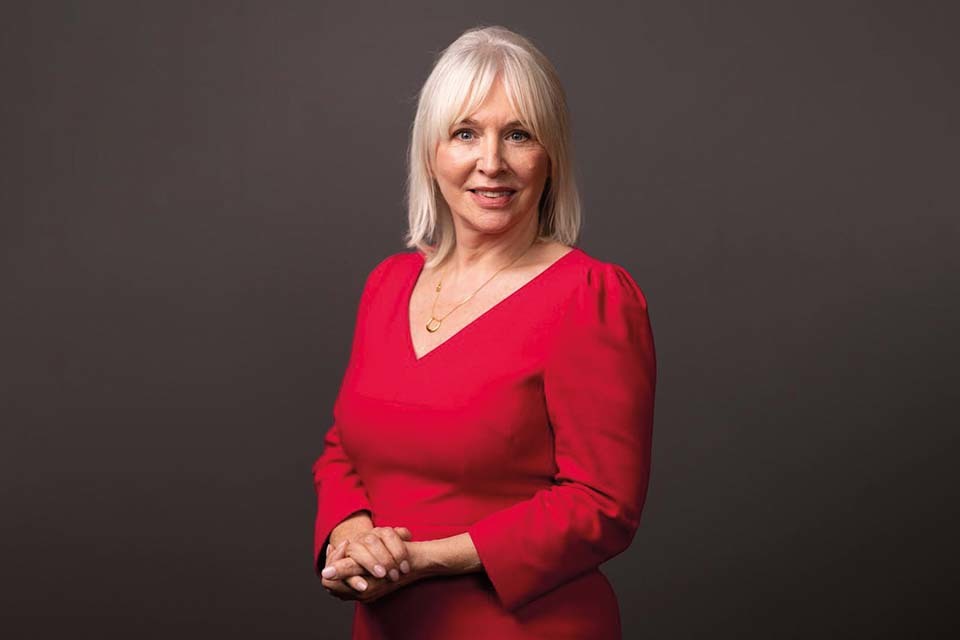
We know how important it is for homes and businesses to have fast and reliable digital connectivity — and how frustrating it can be to feel left behind in the digital slow-lane. That is why the Prime Minister’s commitment to nationwide gigabit-capable broadband and 4G mobile coverage is a central plank of our plan to level up communities across the UK.
We are investing £5 billion so hard-to-reach areas can get next-generation gigabit connectivity that is ultra-reliable and capable of more than 1,000 megabits per second. Our target is to reach at least 85% gigabit-capable coverage by 2025, and we will seek to accelerate roll-out further to get as close to 100% as soon as possible. We have already upgraded 600,000 hard-to-reach homes and businesses to gigabit, and in three years national coverage has rocketed from 6% to 68% of premises.
We are improving mobile connectivity. Our flagship programme is the £1 billion Shared Rural Network. This is working with mobile operators to deliver reliable mobile broadband to 95% of the UK. This will address the digital divide by improving 4G coverage across the United Kingdom.
These UK-wide upgrades are a leap forward akin to the industrial revolution. They will give us the fast, reliable networks we need for decades to come. This will pave the way for new and unexpected developments in commerce, trade and technology. These upgrades will bring jobs, innovation and economic growth.
From 1 April 2022, I have established Building Digital UK (BDUK) as an Executive Agency of the Department for Digital, Culture, Media and Sport (DCMS).
I endorse this Corporate Plan and I support BDUK as a new Executive Agency and its delivery.
Nadine Dorries MP
Secretary of State for Digital, Culture, Media and Sport
“BDUK will give us the fast, reliable networks we need for decades to come.”
Chief Executive’s introduction

Paul Norris
The creation of Building Digital UK (BDUK) as an Executive Agency of the Department for Digital, Culture, Media and Sport (DCMS) is an important moment in the delivery of the country’s digital infrastructure. It marks a determination to bring clear drive and focus to expand the UK’s gigabit and mobile connectivity.
I am proud to lead BDUK at its establishment as an Executive Agency, and I am pleased to present this Corporate Plan for 2022 to 2023. BDUK has a clear mission: to ensure that homes and businesses across the UK can access fast and reliable digital connectivity.
The Corporate Plan sets out our objectives, measures and milestones to:
- deliver gigabit-capable connectivity to premises outside of commercial suppliers’ plans
- improve mobile internet connectivity by delivering the Shared Rural Network programme
- provide excellent financial management, supported by strong governance and risk frameworks
- build practical digital solutions to solve BDUK’s delivery challenges
As a new Executive Agency, BDUK will build on the successes we have achieved as part of DCMS, including:
- delivering the government’s target that at least 95% of premises can access superfast broadband
- clearing the 700 MHz radio spectrum in readiness for implementation of 5G networks
- stimulating investment and innovation in full-fibre broadband through our Local Full Fibre Network, Rural Gigabit Connectivity and TransPennine Initiative programmes
- building a team who are dedicated to, and passionate about, improving the UK’s digital connectivity
The real-world benefits of our work are transformative. Ofcom data shows that 97% of UK homes and businesses can currently access superfast speeds in excess of 30 megabits per second, suitable for simultaneously streaming videos, making video calls and connecting to the online services that have become so important to our lives and livelihoods.
In March 2021, BDUK launched Project Gigabit. The aims of this new programme are to achieve increased productivity, economic growth and help to close the digital divide by delivering a step change in connectivity for homes and businesses. Project Gigabit will help to deliver the government’s ambition for gigabit connectivity, providing coverage to at least 5% of UK premises within the National Infrastructure Strategy’s 85% target by the end of 2025, and as close as possible to 100% as soon as possible afterwards.
In parallel, through the £1 billion Shared Rural Network programme, BDUK will deliver 4G coverage to 95% of the UK’s landmass by the end of 2025, working with the four mobile network operators and supporting their plans to increase geographical coverage.
These complex programmes are some of the most difficult in the country. For example, the fibre to connect the first 80% of homes would go round the world five times. The final 20% targeted by Project Gigabit is another four times around the world — our quintessential countryside is as challenging as it is beautiful.
Delivering these programmes is a team effort across government, industry, local authorities, Devolved Authorities, regulators, consumer groups and citizens. Strong collaboration is critical for delivering our shared goal of world-class connectivity, and I extend my thanks to everyone who works with BDUK to achieve this shared goal.
In BDUK, we must develop our capability and capacity alongside delivering these challenging plans. We are focussed on attracting, developing and retaining the right staff to deliver these complex programmes across a multi-site operation, with our new headquarters in Manchester. Our values, set out in this plan, are at the heart of how we operate.
This Corporate Plan sets out our objectives for 2022 to 2023 that will set us up to deliver our targets for 2025 and beyond. Our objectives reflect the lead-in times for the major procurements for both of our flagship programmes, which are our first milestones on the road to nationwide gigabit connectivity. We have included objectives showing how we will grow BDUK’s capacity as part of our longer term Target Operating Model, as well as laying the foundations for our good governance as a new Executive Agency.
An important leading indicator this year for Project Gigabit will be our success in preparing, launching, and then signing new procurements. BDUK publishes a quarterly Project Gigabit delivery update and our contract pipeline can be found on the GOV.UK website. Our key performance indicator is the number and percentage of premises passed through BDUK interventions.[footnote 1][footnote 2] With contracts running for three to five years, and voucher lead times of twelve months, our delivery today reflects the hard work building the pipeline in years gone by.
For the Shared Rural Network, the key performance indicator is coverage, measured by Ofcom, with targets broken down by region. Detailed key performance indicators for our two main flagship programmes are found later in this Corporate Plan.
The year ahead will be exceptionally busy. I look forward to the challenges and successes that I am sure it will bring.
Paul Norris
Chief Executive Officer, Building Digital UK
“BDUK has a clear mission: to ensure that homes and businesses across the UK can access fast and reliable digital connectivity.”
Who we are
BDUK is a new Executive Agency of DCMS with a mission to ensure that homes and businesses across the UK can access fast and reliable digital connectivity.
As an Executive Agency, the Chief Executive Officer (CEO) is both the Accounting Officer and the Senior Responsible Officer for the Gigabit and Shared Rural Network programmes. The CEO is held to account through sponsor relationships with the Secretary of State, Sponsor Minister and DCMS Principal Accounting Officer. The CEO will be advised and challenged on strategy, delivery and risk management by the newly established BDUK Board.
BDUK works closely with policy colleagues in the Digital Infrastructure Directorate of DCMS to support the implementation of barrier-busting measures to enable commercial suppliers to deliver gigabit connectivity to homes and businesses. BDUK also supports the policy team in the development of alternative options to connect a small number of premises that are ‘Very-Hard-To-Reach’ and are not expected to be reached through our current programmes.
BDUK has ambitious and challenging targets, underpinned by four core values: Delivering Excellence, Embracing Challenges, Respecting Differences and Working Together.
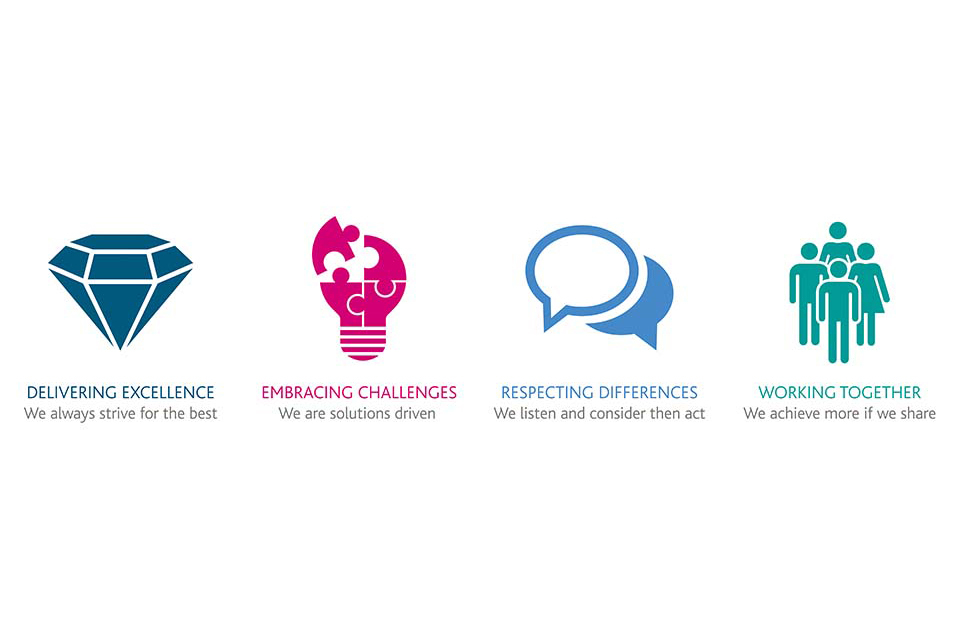
BDUK delivers programmes through these values and in doing so brings positive impacts for people across the UK. Our programmes are ultimately about people - colleagues, partners, suppliers and citizens - people like:
Gavin and Belinda Keeble, whose Gigabit Vouchers went towards funding the cost of installing gigabit-capable broadband for 121 homes and 56 businesses in their remote dale in Cumbria.

Gavin and Belinda
The staff and students at Borrowdale CE Primary School in rural Cumbria needed better connectivity to use the latest learning technologies, not to mention to enable home learning and better contact with parents. Now, thanks to BDUK’s Rural Gigabit Connectivity Hub scheme, students and teachers can access the very latest resources using gigabit-capable speeds, with the school even installing paid for parking for local hikers, providing a small income.

School
Family business, Bonnie Tartan, based near the town of Dunblane in rural Scotland, specialises in producing the finest tartan clothing. The company had poor broadband and this impacted significantly on sales. They were able to form a community group and fund the cost of broadband installation from the Gigabit Voucher scheme and Stirling Council’s Community Infrastructure project, and are now future-proofed for business expansion.

Bonnie and David
BDUK programmes are delivered to citizens through suppliers, working closely with local bodies, the Devolved Authorities and other government departments. BDUK’s Gigabit Voucher scheme interacts directly with citizens through the website.
We recognise the responsibility vested in us. As a new Executive Agency, we are committed to improving lives and communities across the UK by ensuring that homes and businesses across the UK can access fast and reliable digital connectivity.
What we do: Project Gigabit
Project Gigabit’s objective is to level up the UK by giving hard-to-reach areas access to gigabit-capable internet speeds, and, coupled with commercial gigabit delivery, ensure almost all of the UK has access to gigabit-capable internet as soon as possible.
Project Gigabit was launched in March 2021, building on successful legacy programmes such as Superfast and Rural Gigabit Connectivity. Up to £1.2 billion of spending has been committed until the end of 2024 to 2025, out of a £5 billion commitment over the lifetime of the programme.
BDUK interventions will deliver gigabit-capable connectivity to at least 5% of premises across the UK in hard-to-reach areas by the end of 2025, supporting the government’s target of at least 85% through a combination of commercial and subsidised build. We aim to accelerate roll-out to get as close to 100% as soon as possible. While the vast majority of the UK’s premises will be able to access gigabit-capable services through commercial suppliers’ build plans, a large number of premises require government subsidy.
Meeting our objectives
To meet our objective of providing coverage to at least 5% of hard-to-reach premises by 2025, we need to pass a minimum of 1.56 million premises by the end of 2025. Through our interventions, we have already passed 600,000 and therefore need to pass a further 960,000 premises to meet our target. This will be done through a strategic approach using four types of subsidy to suit supplier and local needs.
Delivery in detail: Project Gigabit’s four subsidies
The non-commercial premises within the government’s 85% gigabit-capable target are being delivered by BDUK through four main interventions:
-
Superfast contracts: delivery continues through projects under the Superfast Broadband Programme, with most remaining projects now reconfigured to deliver gigabit-capable connectivity. Extra funding from Project Gigabit is being used to extend existing contracts to deliver additional gigabit infrastructure.
-
Gigabit Broadband Voucher Scheme: vouchers worth up to £1,500 for residential, and up to £3,500 for commercial premises, which can be claimed by anyone in an eligible area to cover the costs of a supplier extending their network to their premises. Top-up schemes are in place where local and Devolved Authorities can add their own public funding to help boost the value of vouchers.
-
GigaHubs: grants to connect vital local public services in hard-to-reach areas, typically schools, libraries, and GP surgeries.
-
Gigabit contracts: subsidies to suppliers to extend their plans to build gigabit-capable infrastructure to premises that will not be reached by their commercial plans alone. This support ranges from smaller local contracts (aimed at reaching 1,000 to 10,000 premises), to larger regional contracts (40,000 to 100,000) and, lastly, the potential for cross-regional contracts (up to 500,000).
Hard-to-reach premises
BDUK’s subsidies are targeted at the hardest-to-reach 20% of UK premises. These include a diverse selection of locations, predominantly (though not exclusively) in rural locations. For the first round of releases under our Gigabit contracts, 85% of premises will be rural (95% rural in the smaller local contracts).
Hard-to-reach premises typically have some of the UK’s slowest speeds, which is why BDUK has designed its interventions to prioritise delivery to areas that currently have sub “superfast” (under 30 megabits per second) speeds.
Adapting to a dynamic market
The UK’s digital infrastructure market is highly dynamic with over 80 active suppliers investing in full fibre networks across the nations. This market is expected to build to at least 80% of the UK’s premises on a commercial basis, with BDUK’s programmes providing support for those premises the market will not build to without subsidy.
Suppliers’ rapidly evolving plans have seen the market extend its commercial gigabit coverage to many places originally expected to require public funds. We strongly welcome this as it means more premises will be connected to fast, reliable internet more quickly. The challenge this dynamic market presents for BDUK is ensuring that we effectively manage the risk of subsidising network builds in areas that suppliers’ commercial plans will go. To this end, BDUK works with commercial suppliers to carefully identify premises requiring subsidy through our Gigabit contracts.
BDUK’s key principles
-
Targeting hard-to-reach areas.
-
Prioritising areas with the slowest broadband speeds. BDUK prioritises delivery to areas where homes and businesses cannot access superfast network connections (premises with less than 30 megabits per second) wherever practicable. We know these premises have an urgent need for upgrades, so the contracts we award are designed to prioritise delivery to those homes and businesses early on.
-
Planning and executing delivery alongside commercial roll-out. To ensure that hard-to-reach areas are not left behind while commercial coverage is being built elsewhere, it is important to ensure that premises excluded from commercial plans are included within our programme.
-
Ensuring value for money, by minimising the risk of funding premises that could have been built commercially, and ensuring subsidies to suppliers represent good value.
-
Adapting to change. As a decade-long programme, Project Gigabit will adapt to changing technology, changing market appetite and capacity in the pursuit of going as far and as fast as we can for areas with poor access to good broadband.
-
Regular and transparent reporting. BDUK already publishes quarterly Project Gigabit Delivery Plan updates that provide details about the location and timing of procurements for each area of the UK. In addition, BDUK will publish delivery performance in our Annual Report and Accounts. As we conduct detailed market surveys in each Intervention Area, we publish the outcomes and identify where we propose to intervene. BDUK also shares as much information as it can about planned Gigabit contracts, recognising commercial sensitivity and the dynamic nature of our programme. Once contracts are awarded, full details will be published in line with UK Subsidy Control provisions.
Designing Intervention Areas
Prior to launching Project Gigabit contracts, BDUK undertakes a comprehensive assessment of the market’s commercial plans in each part of the country. These assessments make up the ‘Open Market Review’ and later the ‘Public Review’ stages as described in the box below. Given the scale of commercial gigabit delivery and the number of suppliers now active in the market, this is a significant endeavour for each area. The results of these reviews form the basis of our Intervention Areas (i.e those areas that we have assessed as eligible for support under our intervention programmes).
Throughout 2022 to 2023, BDUK will continue to run procurements to support delivery through to 2025 and beyond. Our latest plans include our schedule to complete Open Market Reviews and Public Reviews for all non-metropolitan areas of England. Similar reviews will be undertaken in Scotland, Wales and Northern Ireland. The box below outlines the key steps in the process for mapping, designing and tendering our procurement contracts.
Delivery in detail: Steps in the Project Gigabit contracts process
BDUK’s Project Gigabit contracts subsidise commercial suppliers to build gigabit-capable connections to premises outside the reach of the commercial sector’s build plans (i.e. to premises that are not commercially viable for commercial suppliers). Identifying the premises outside the reach of commercial suppliers’ build plans is critical because subsidising gigabit-capable connections to premises that commercial suppliers plan to build to would not represent good value for money and could risk distorting the commercial market. BDUK has developed methods to respond to this challenge through its procurement process.
The first step is to gather data on commercial suppliers’ build plans, which BDUK obtains from commercial suppliers through Open Market Reviews and (later) Public Reviews. These assessments are comprehensive, take several months to conduct, and must be completed before BDUK launches a procurement to ensure compliance with UK rules and controls around using government subsidies.
This process allows BDUK to create detailed, targeted Intervention Areas, deferring procurements where suppliers have plans to build gigabit connectivity. In areas where supplier build is uncertain, we may wait to see how suppliers’ plans develop. In these areas, the Voucher Scheme may be available to subsidise gigabit connectivity.
After the Open Market Review and Public Reviews, but before a procurement formally launches, BDUK’s commercial experts engage in a period of Pre-Procurement Market Engagement, readying the market and potential bidders ahead of a formal launch and making sure that the proposed contracts are viable and represent value for money. The procurement processes currently take around seven months for a local supplier contract and around ten months for a regional supplier contract. Regional contracts include the following steps:
- Standard Supplier Questionnaire - supplier responses, followed by BDUK evaluation, assurance and governance
- Invitation-to-Tender - supplier responses, followed by BDUK evaluation, clarifications and procurement report, governance (BDUK, DCMS and the Cabinet Office), contract award notification, a standstill period and final contract signature

Cafe Owners
Measures of success
BDUK will report delivery performance in its Annual Report and Accounts. Project Gigabit’s key measure of success is ‘premises passed through BDUK interventions’. A premise is ‘passed’ when it is able to take up a gigabit-capable service without significant additional connection costs.
Table 1 sets out the profile for the number and percentage of hard-to-reach premises passed by BDUK interventions to achieve 5% UK coverage by the end of 2025. Our aspiration is to significantly exceed this profile, but it is still early in the life of Project Gigabit. The table also shows our estimated trajectory for the total percentage of premises passed - including commercial build - to reach at least 85% by the end of 2025.
This year is a transitional year because many of our Superfast contracts - including those that have been reconfigured to deliver gigabit capability - will come to an end ahead of the start of delivery by our new Gigabit contracts. The projected minimum premises passed for 2022 to 2023 reflects this, with 2023 to 2024 going on to more than double delivery as the first batch of new contracts contributes a full year of build.
Looking beyond the end of 2025, BDUK aims to accelerate roll-out to as close to 100% of the UK as quickly as possible. Delivery will increase when all contracts are signed and operating at a full build pace. Another key measure of success this year will therefore be our success in launching and signing Gigabit contracts, this is a forward view of commercial activity to be undertaken by the programme.
Table 1: Profile for the number of premises passed through BDUK interventions to reach the minimum delivery target of 5%
| By end 2020 - 2021 | April 2021 - March 2022 | April 2022 - March 2023 | April 2023 - March 2024 | April 2024 - March 2025 | April 2025 to December 2025 | |
|---|---|---|---|---|---|---|
| Number of premises passed by BDUK interventions | 600,000 | 120,000 | 110,000 | 225,000 | 280,000 | 225,000 |
| Cumulative premises passed by BDUK interventions | 600,000 | 720,000 | 830,000 | 1,055,000 | 1,335,000 | 1,560,000 |
| Per cent premises passed | 2% | 2% | 3% | 3% | 4% | 5% |
| Total per cent premises passed (includes market delivery) | 39% | 66% | 71% | 75% | 80% | 85% |
Notes:
1. Number of premises passed by BDUK interventions: Shows the number of premises BDUK has passed / expects to pass - with its interventions. There is a significant ramp up as our Gigabit contracts come into delivery from late 2022 to 2023, while legacy Superfast contracts begin to wind down after 2021-22.
2. Cumulative premises passed by BDUK interventions: Shows a running total of the premises passed using BDUK interventions.
3. Per cent premises passed: Shows the cumulative percentage of premises passed by BDUK as a proportion of the UK’s premises — with at least 5% reached by the end of 2025.
4. Total % premises passed (includes market delivery): This is the total number of premises BDUK expects to be passed by its own interventions and the wider commercial market. This shows the UK reaching at least 85% premises passed by the end of 2025.
What we do: Shared Rural Network
The Shared Rural Network (SRN) programme will level up coverage in rural areas of the UK through a £1 billion deal with the four Mobile Network Operators (MNOs), delivering 4G coverage to some of the hardest-to-reach parts of the country. It will allow for new applications to flourish in rural sectors, give more choice to rural consumers on their mobile providers and how they access the web, and help the emergency services deliver vital support to the UK’s most remote communities.
This programme will see MNOs collectively increase 4G mobile phone coverage throughout the UK to 95% by the end of the programme, underpinned by legally binding coverage commitments, and for each MNO to have 90% geographical UK coverage by 2025. The Scottish Highlands and Islands, Mid and West Wales and the North East of England will see the largest increases in 4G signal:
- In Scotland, coverage from all four MNOs will increase by two thirds, from 44% to 74% of the landmass
- In Wales, 4G coverage from all four MNOs will increase by a third from 60% to 80%
- In North East England, coverage will increase from 68% to 86% from all four MNOs. Coverage from at least one MNO will increase from 91% to 98%

Biker
The programme is delivered in two parts:
-
The first phase will see the four MNOs collectively invest over £532 million in a shared network of new and existing phone masts. This will help tackle Partial Not Spots, which are areas where there is currently coverage from at least one, but not all, mobile operators.
-
The second phase, running in parallel, will see the government invest over £500 million to go even further to significantly reduce Total Not Spots, which are areas where there is currently no coverage from any mobile operator. As part of this government-funded element of the programme, there will be upgrades to Extended Area Service masts being built as part of the Home Office’s Emergency Services Network. This will make these masts usable by the four MNOs.
The maps below show projected 4G coverage before and after the SRN programme, with blue as areas that have coverage, yellow as Partial Not Spots, and Orange as Total Not Spots. More details of our coverage targets for 2025 by region can be found here. BDUK will report progress against these targets, measured by Ofcom.[footnote 3]
Maps showing projected coverage by the end of the Shared Rural Network programme
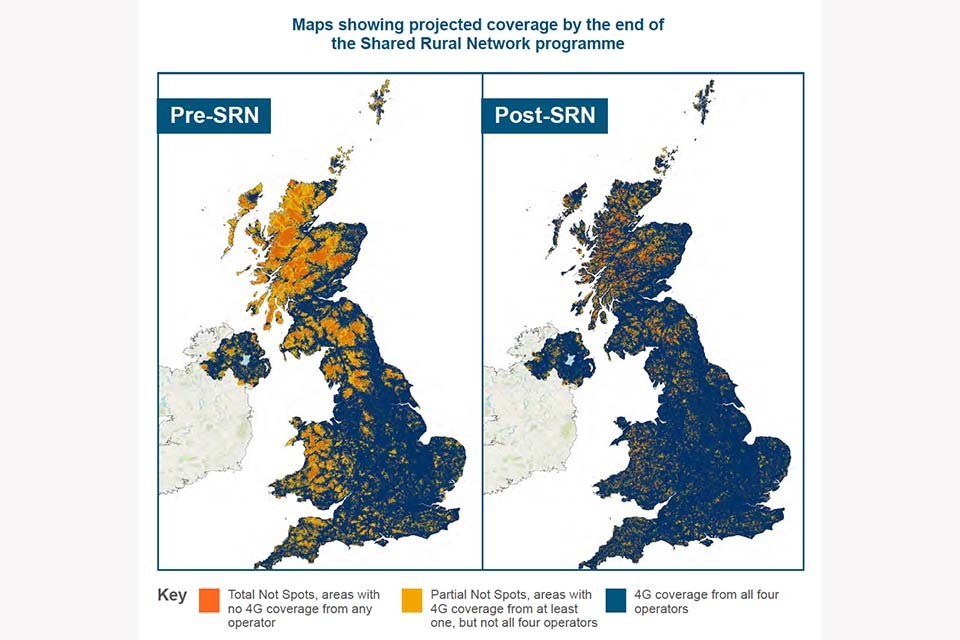
Maps showing projected coverage by the end of the Shared Rural Network programme
Overview: Our objectives for 2022 to 2023
This plan sets out our five key objectives for the year starting in April 2022 and ending in March 2023. These objectives support our mission to ensure that homes and businesses across the UK can access fast and reliable digital connectivity.
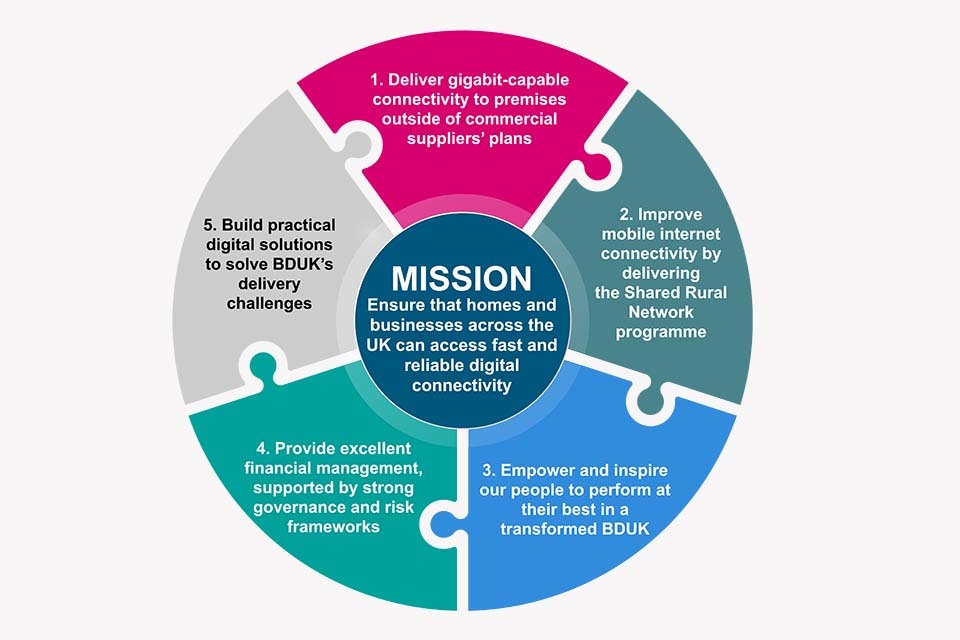
Mission
These objectives are underpinned by ten sub-objectives, providing greater detail on what BDUK will achieve, with measures and milestones showing how and when we will achieve them.
In 2023 to 2024, at the end of its first year as an Executive Agency, BDUK will publish a Three Year Plan alongside a refreshed annual Corporate Plan. The Three Year Plan will provide a longer term view of our objectives, measures and milestones up until the end of March 2026.
Measuring success
BDUK has published specific measures and milestones against each sub-objective, which it will report against in its Annual Report and Accounts. The BDUK Annual Report and Accounts will also include the following six key delivery metrics set out in Table 2 below.
Table 2: BDUK’s key delivery metrics
| Question the metric will answer | Name of measure | What it measures |
|---|---|---|
| Are we on track to hit our objectives? | Premises passed | Gigabit-capable premises passed by BDUK interventions against target, segmented by product, region, and premises type. |
| 4G coverage | 4G landmass coverage, segmented by nation. | |
| Are we delivering good value for money? | Value for money | Average subsidy per premises connected. |
| Are we on budget? | BDUK capital spend | Project Gigabit, SRN and Superfast capital spend by BDUK interventions against budget. |
| BDUK resource spend | How much BDUK has spent on its workforce and resources over the past year. | |
| Are we building the right team? | BDUK workforce against Target Operating Model | How many people we have employed into roles from our Target Operating Model. |
Fulfilling the government agenda
The BDUK objective to build nationwide gigabit-capable broadband and extend 4G mobile infrastructure in the most remote geographies supports the DCMS priority outcome to increase economic growth and productivity through improved digital connectivity. This includes launching projects across the Union, working with Devolved Authorities to ensure gigabit connectivity is available across the UK, providing new Project Gigabit funding, as well as continuing to support the roll-out of legacy local and national programmes (such as Superfast Cymru and Scotland’s R100 contract).
The Levelling Up white paper includes digital connectivity as one of its 12 missions with the goal of ensuring that: ‘By 2030, the UK will have nationwide gigabit-capable broadband and 4G coverage, with 5G coverage for the majority of the population’.[footnote 4] The white paper specifically highlights that improved digital connectivity has the potential to drive growth and productivity across the UK and widen job opportunities through remote working.
Sustainability and net zero
BDUK will mirror the DCMS commitment to embed sustainability into its activities. It will meet the Greening Government Commitments to reduce and improve the impact its operations have on the environment. With offices in Manchester and London based within the DCMS estate, this commitment includes reducing water consumption, greenhouse gas emissions and waste.
In regards to net zero, digitalisation plays a major role in carbon reduction, so it is important that we understand the impact of the enabling digital infrastructure we procure and fund. The majority of our contracts will oblige our suppliers to confirm their commitment to reaching net zero by 2050. Suppliers do this by providing their carbon reduction plan and detailing their environmental measures being undertaken. [footnote 5]
This is a pass or fail element of the supplier selection. In the next year, we will also continue to work with Ofcom to share research and learnings on carbon emissions impact.
Diversity and inclusion
BDUK is committed to improving the diversity of its workforce and creating an inclusive workplace. We will offer work placements through the DCMS summer diversity and autism exchange programmes, and take steps to ensure that our employees reflect the UK workforce in line with civil service ambitions for representation. Our culture of inclusion will be built upon through initiatives focused on wellbeing and our values and behaviours for all staff across the organisation.

Working together
Detailed objectives 2022 to 2023
1. Deliver gigabit-capable connectivity to premises outside of commercial suppliers’ plans
BDUK interventions will increase gigabit-capable coverage by at least 5% by the end of 2025 by targeting premises outside of suppliers’ commercial plans. This will support the government’s objective to reach at least 85% of UK premises with gigabit-capable coverage by 2025, while seeking to accelerate roll-out to get as close to 100% as soon as possible.
The BDUK goal for 2022 to 2023 is to subsidise at least 110,000 premises with a gigabit-capable connection.
| ID | Sub-Objective | 2022 to 2023 Measure | Milestone |
|---|---|---|---|
| 1.1 | BDUK will deliver at least 110,000 premises passed through its subsidies. Key stakeholders including suppliers, local bodies, and other government departments will be engaged and a challenging pipeline of procurements, hubs and vouchers projects developed and implemented. | Maintain a voucher, hubs, procurements and Superfast delivery pipeline. Launch and conclude procurements in line with our quarterly published pipelines to build future years’ delivery. |
Quarterly updates |
| Ensure at least 110,000 premises are passed including: At least 75,000 premises passed with gigabit-capable connections using Superfast contracts. At least 35,000 premises passed using vouchers and hubs. |
By end 2022 to 2023 | ||
| Launch Open Market Reviews to gather supplier data for all non-urban Phase 3 Intervention Areas in England and undertake Public Reviews with Wales and Scotland. | By end 2022 to 2023 | ||
| 1.2 | BDUK will review and evaluate its products for efficiency and effectiveness. | Perform reviews on the effectiveness and value for money of hubs and vouchers, recommending ways BDUK can improve these schemes. | Biannual reviews |
| Launch the Project Gigabit evaluation programme to evaluate the long-term benefits of BDUK’s gigabit-capable build. | By end 2022 to 2023 |
2. Improve mobile internet connectivity by delivering the Shared Rural Network programme
The Shared Rural Network (SRN) will see the government and industry jointly invest over £1 billion to increase 4G mobile coverage throughout the UK. The objective of the SRN programme is to increase UK 4G geographical coverage from 91% in 2020 to 95% by 2025.
| ID | Sub-Objective | 2022 to 2023 Measure | Milestone |
|---|---|---|---|
| 2.1 | BDUK will work in collaboration with the Home Office on delivery of the upgrade of the Extended Area Services (EAS) sites, including completing any outstanding commercial agreements and procurements, supporting supplier engagement, and proactively working together to accelerate the upgrade of EAS sites through the gateway process.[footnote 6] | Sign the Master Site Sharing Agreement (MSSA - this is an agreement between the Home Office and Mobile Network Operators). | By end Q2 2022 to 2023 |
| Oversee the completion of the Home Office’s transmission procurement.[footnote 7] | By end Q1 2022 to 2023 | ||
| Make the first EAS pilot site available to the MNOs for SRN pilot deployment. | By end Q3 2022 to 2023 | ||
| Agree outstanding commercial agreements to enable the MNOs to deploy kit on EAS sites (and incorporate any necessary changes into the MSSA). | By end 2022 to 2023 | ||
| 2.2 | BDUK will provide oversight and challenge to Digital Mobile Spectrum Limited (DMSL) on their delivery of the Total Not Spots part of the programme, in order to progress procurements, procurement awards, and begin site acquisition. | Oversee the Acquisition, Design and Build / Managed Solution procurement award and the finalisation of the underpinning contracts. | By end Q1 2022 to 2023 |
| Oversee the transmission and off-grid power procurement award and finalisation of the underpinning contracts. | By end Q2 2022 to 2023 | ||
| Oversee the start of formal radio site acquisition. | By end Q2 2022 to 2023 |
3. Empower and inspire our people to perform at their best in a transformed BDUK
BDUK wants to create an environment in which our people can perform at their best to achieve our objectives.
| ID | Sub-Objective | 2022 to 2023 Measure | Milestone |
|---|---|---|---|
| 3.1 | BDUK will strengthen its capability and capacity by recruiting roles into a Target Operating Model and retain existing expertise through better employee engagement and a commitment to the wellbeing of staff. | Increase the number of people brought into roles from the Target Operating Model. | By end 2022 to 2023 |
| Ensure employee engagement (as tracked in the annual Civil Service People Survey) improves in 2022 to 2023. | By end 2022 to 2023 | ||
| Implement succession planning for critical roles and ensure BDUK staff have career pathways. | By end 2022 to 2023 | ||
| Reduce turnover from 2021-22 benchmark. | By end 2022 to 2023 | ||
| 3.2 | BDUK will strengthen its commitment to respect, fairness and diversity and inclusion. | Offer work placements through the summer diversity and autism exchange programmes. | By end Q2 2022 to 2023 |
| Deliver training to improve the culture of BDUK. | By end 2022 to 2023 | ||
| Successfully implement hybrid working. | By end 2022 to 2023 | ||
| 3.3 |
BDUK will establish reporting systems for the new Executive Agency and set up the systems and processes it needs for operational autonomy, including: Strengthened change governance, so change to the business is as efficient as possible. Strengthen BDUK’s governance of continuous improvement activities. |
Finalise implementation of the financial accounting system for BDUK. | By end Q2 2022 to 2023 |
| Strengthen organisational capability by implementing a full Change Initiation Gateway framework. | By end 2022 to 2023 | ||
| Undertake a review of the Target Operating Model. | By end 2022 to 2023 |
4.Provide excellent financial management, supported by strong governance and risk frameworks
Plan, challenge and manage finances to meet our programmes’ delivery objectives effectively while achieving value for money. Assure this expenditure with strong governance structures and robust risk management.
| ID | Sub-Objective | 2022 to 2023 Measure | Milestone |
|---|---|---|---|
| 4.1 | BDUK is an efficient organisation that protects value for money for taxpayers. We will plan and manage resource and capital expenditure to ensure that BDUK spend is within the funding available in 2022 to 2023. We will deliver value for money through our subsidy contracts by challenging supplier data and claims, as well as interrogating pricing. | Operate within delegated funding limits and in line with DCMS requirements. | Ongoing 2022 to 2023 |
| Carry out assurance assessments on all programmes. | Ongoing 2022 to 2023 | ||
| 4.2 | BDUK will develop, implement and continuously improve governance, embedding best practice across the organisation. This includes legal compliance (such as subsidy control and counter fraud), as well as building a comprehensive, efficient and effective approach to the management of risk. | Establish the BDUK Board, with full permanent membership, and the BDUK Audit and Risk Assurance Committee. | By end Q2 2022 to 2023 |
| Introduce and embed a refreshed risk management framework and counter-fraud strategy for BDUK. | By end Q2 2022 to 2023 | ||
| Review BDUK’s assurance and deliver an organisation-wide Integrated Assurance and Approvals Plan, including establishing a new internal audit function. | By end Q2 2022 to 2023 |
5. Build practical digital solutions to solve BDUK’s delivery challenges
Support delivery of programme objectives, ensuring collaboration across BDUK functions to enhance performance and develop solutions.
| ID | Sub-Objective | 2022 to 2023 Measure | Milestone |
|---|---|---|---|
| 5.1 | BDUK will create and / or deliver digital tools and platforms to strengthen operational delivery of our subsidies. This includes the development of our platform that allows for the collection, triage, and analysis of delivery data from suppliers. This supports decision making throughout the organisation, identifying potential Intervention Areas as well as opportunities to optimise the mix of subsidies. | Develop the platform that allows for the efficient collection, triage, and analysis of delivery data from suppliers. | By end 2022 to 2023 |
| Strengthen digital platforms to manage the processing of payments to suppliers. | By end 2022 to 2023 |
Financial management
BDUK is funded through Resource Delegated Expenditure Limit (DEL) and Capital DEL allocations.
Our Resource DEL covers the running costs of the programmes, including funding for evaluation and analysis activities, communications, commercial activities, corporate services, local delivery, programme management, governance, risk and compliance, transformation and change, and strategic oversight and development. It also covers the costs of information technology, learning and development, and accommodation costs.
Our Capital DEL is utilised across our programmes including Project Gigabit, Shared Rural Network, Superfast Broadband and legacy Local Full Fibre Networks programme.
Table 3: Total BDUK Resource funding
| Resource DEL | ||
|---|---|---|
| (£ million) | 21/22 Forecast Outturn | 22/23 Budget |
| Programme Resource | 40.7 | 40.0 |
| Admin Resource | 2.0 | 1.0 |
| Total Resource DEL | 42.7 | 41.0 |
Table 4: Total BDUK Capital funding by programme
| Capital DEL | ||
|---|---|---|
| (£ million) | 21/22 Forecast Outturn | 22/23 Budget |
| Superfast | 3.7 | 7.0 |
| Local Full Fibre Networks | 24.2 | - |
| Project Gigabit | 58.3 | 157.3 |
| Shared Rural Network | 0.5 | 18.3 |
| Total Capital DEL | 86.7 | 182.6 |
What are our risks, and how will we manage them?
BDUK’s delivery plan is challenging with a dynamic market environment and in the context of an ever changing world. It is essential that we identify and manage the risks we face, understand where the threats and opportunities are, and map our appetite for risk.
BDUK has made improvements in risk maturity, enabling us to become smarter risk takers in the face of a changing risk profile. Identifying risk consistently and comprehensively, alongside defining and working within our risk appetite, gives us flexibility to deliver our ambitions while protecting the integrity of our core operations.
As BDUK progresses into 2022 to 2023, the focus on quality risk management will continue to ensure that we reflect change across the external environment. We will also continue to develop our assurance framework to support delivery.
BDUK will establish an Audit and Risk Assurance Committee in line with appropriate guidelines. A programme of internal audit will be established with the Government Internal Audit Agency (GIAA) acting as internal auditors. The National Audit Office (NAO) will provide external audit to the BDUK accounts. Both GIAA and NAO will attend the BDUK Audit and Risk Assurance Committee.
The following represent the key strategic risks to the delivery of this Corporate Plan.
| Risk | Mitigations |
|---|---|
| Project Gigabit supplier engagement and delivery: There is a risk that suppliers do not deliver coverage within the timescales that are required because of insufficient market capacity, willingness or interest to enter into contract, or the possibility of supplier insolvency. This could result in BDUK missing delivery targets and resulting lack of coverage and reputational damage. | Stakeholder engagement through the Project Gigabit procurement process, early market engagement, effective contract management which engages regularly with suppliers, incentivising delivery alongside commercial build, gathering capacity information and targeting interventions accordingly, and using various contract and product types. |
| Demand led gigabit delivery: There is a risk that BDUK misses its demand based delivery targets and activities because suppliers are slow to complete voucher supported builds or there is a limited appetite for vouchers. | Continuous user research and lessons learned to improve voucher take-up including mechanisms such as increasing the pipeline, changing engagement processes, and closer follow-up with key suppliers. |
| Shared Rural Network delivery: There is a risk that the Shared Rural Network programme fails to reach its 95% UK coverage because of the complexity of the dependency on, and negotiations with, Mobile Network Operators. | Close partnership working with the Mobile Network Operators to deliver clear plans for UK coverage - particularly Total Not Spots. |
| Technology, capacity and capability: There is a risk that BDUK does not grow, build or recruit the right capacity and capability in the right areas to achieve its objectives. This includes our digital capability, where attracting talented technical professionals is a key enabler for streamlining and automating processes. | A progressive and engaging People Strategy which addresses the challenges faced, reducing staff turnover in order to maintain expertise and grow talent, improving succession planning, and making learning and development a key organisational priority. Prioritise the growth of BDUK’s technical expertise. |
| Planning and resources: There is a risk that BDUK does not have the resources in the right places to deliver its objectives because of the continued pressure on public finances, ineffective planning processes, capability and / or focus. | Development of an integrated plan which brings together delivery and resources to remove barriers and bottlenecks, ensuring resources are aligned to priorities and that the business model is flexible to changing priorities. |
How we are governed
BDUK is governed by the BDUK Board, which operates under the provisions of a Framework Document approved by Ministers. Accountability for BDUK activities and decision-making rests with Paul Norris, who is BDUK’s Senior Responsible Officer and Chief Executive Officer.
The Framework Agreement
The Framework Agreement sets out the Secretary of State’s requirements from BDUK and its Board. It provides BDUK with authority to pursue its strategy as articulated in this Corporate Plan and the freedoms to execute its business effectively. It also specifies the governance arrangements for BDUK.
The BDUK Board
Under the provisions of the Framework Agreement, the Board has the following membership:
- A Non-Executive Chair, who is responsible for leading the Board and ensuring it effectively discharges its role
- Three Non-Executive Directors (NEDs)
- Three BDUK Executives - The BDUK Chief Executive Officer, Chief Financial Officer and Chief Commercial Officer
- A DCMS Representative to provide a link between BDUK and the department
The principal roles of the BDUK Board are to:
- Endorse the BDUK strategy and ensure that strategy is reflected in the BDUK Corporate Plan
- Monitor and assess BDUK’s performance against its Key Performance Indicators as agreed with the Departmental Sponsor
- Provide advice, challenge and support to the BDUK Chief Executive and the senior executive team, and hold them to account for delivery of the BDUK strategy and objectives
- Oversee the financial and operating controls in place, ensuring they are in compliance with the authority given to BDUK and its Chief Executive
Support for the BDUK Board
The BDUK Board is supported by two committees:
- the BDUK Audit and Risk Assurance Committee
- the BDUK Finance and Commercial Committee
The combination of these committees will deliver robust oversight and additional assurance, including on financial and commercial decisions.
Sitting below the BDUK Board are three supporting executive boards:
Project Gigabit Programme Board
Chaired by the Chief Executive Officer, this board provides oversight of work and makes decisions relating to the Project Gigabit programme;
Shared Rural Network Programme Board
Chaired by the Chief Executive Officer, this board provides oversight of work and makes decisions relating to the Shared Rural Network programme; and
BDUK Change and Operations Board
Chaired by the Chief Financial Officer, this board provides oversight and decision making around BDUK operations and corporate services, including prioritisation of resources and organisation changes.
BDUK governance structure diagram
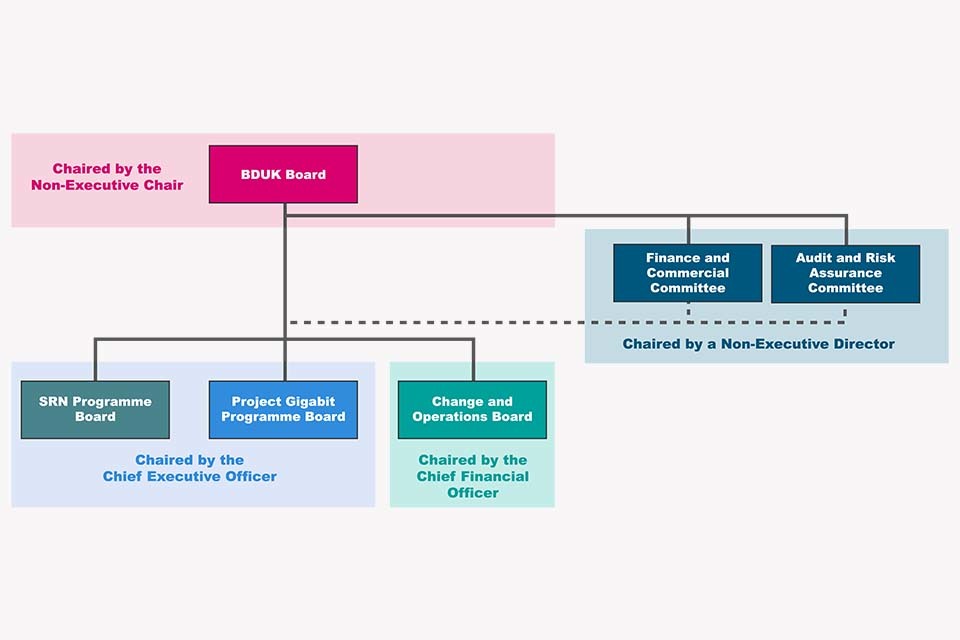
BDUK Organogram
Governance in detail: The Senior Leadership Team
BDUK is led by Paul Norris. As BDUK Chief Executive Officer and Senior Responsible Officer, Paul is supported by Chief Financial Officer Andrew Thomas and Chief Commercial Officer Martyn Taylor, collectively forming the BDUK Executive.
The Executive is supported by the wider Senior Leadership Team, including:
- the Project Gigabit Programme Director, responsible for the delivery of Project Gigabit
- the Shared Rural Network Programme Director, responsible for the delivery of the SRN programme
- the Director for Analysis, Evaluation & Strategy, responsible for BDUK’s strategy and analytics
- the Director for Finance & Human Resources, responsible for BDUK’s Human Resources and Finance functions
- the Director for Commercial, responsible for BDUK’s commercial activities, such as Gigabit contracts
- the Director for Digital, Data & Technology, responsible for designing and implementing BDUK’s technical solutions
- the Director for Transformation & Change, responsible for transforming BDUK into a highly efficient specialist delivery organisation
- the Director for Risk, Compliance & Governance, responsible for designing and implementing BDUK’s governance, risk and assurance frameworks
- the Director for Engagement & Public Information, responsible for BDUK’s wider communications with stakeholders, Parliament and the public
Departmental Sponsor
DCMS is the Departmental Sponsor for BDUK. We continue to build strong working relationships with other government departments, with particular reference to HM Treasury and Cabinet Office.
The primary contact with DCMS is through the DCMS Sponsor Team. The responsible Senior Civil Servant for this relationship is the Director General for Digital and Media. The Sponsor Team forms the main source of advice to the Responsible Minister and Principal Accounting Officer in their responsibilities overseeing BDUK’s overall delivery performance.
-
A premises is passed by one of our interventions when the property in question can receive a gigabit-capable connection at no significant extra cost. ↩
-
“Interventions” and “subsidies” refer to the specific BDUK assistance and incentives offered to suppliers building in hard-to-reach areas — our vouchers, hubs, Superfast contracts and Gigabit contracts ↩
-
Coverage data published in the Ofcom Connected Nations Report ↩
-
‘Levelling Up the United Kingdom’, UK Government, February 2022 ↩
-
Contracts with a net annual value of £5 million or more. ↩
-
Extended Area Service (EAS) is part of the Home Office’s Emergency Service Network (ESN) and will ensure coverage in the most rural and remote parts of the United Kingdom. The EAS masts built for ESN will be made available for other mobile operators to offer commercial mobile coverage under the Shared Rural Network programme. ↩
-
As part of the contract change, EE will be providing installation and a managed service for the maintenance of connectivity in areas covered by the EAS sites. ↩
